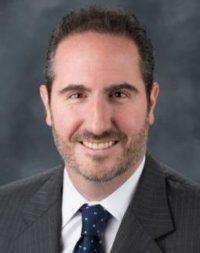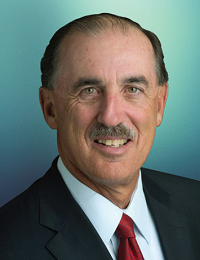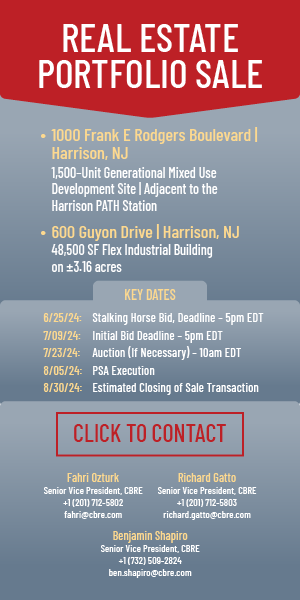CBRE’s tristate capital markets team has stayed connected with clients and colleagues throughout the pandemic, thanks to a series of webinars and virtual programs that have drawn thousands of viewers since the earliest days of the crisis in the U.S.
By Joshua Burd
Jeremy Neuer pointed back to a Wednesday evening last fall, when CBRE welcomed 80 guests to a New York City restaurant for a presentation by the firm’s top researcher in North America.
These days, the idea is almost a foreign concept.

“When’s the next time we can get 80 people inside a restaurant? We don’t know that,” said Neuer, an executive vice president and co-lead of CBRE’s capital markets group in New Jersey.
It’s a reminder of an ongoing challenge in the wake of New Jersey’s coronavirus outbreak: Deals are getting done, investors are touring and many commercial real estate professionals are increasingly bullish — yet staying informed and connected remains a challenge.
CBRE’s tristate capital markets team has taken on that challenge since the earliest days of the crisis, with a series of webinars and virtual programs that featured industry heavyweights and a wide range of topics. After drawing thousands of viewers over more than four months, the firm now plans to continue the series through the fall as the industry continues its recovery.
“There was a hiatus from business as usual, and we just thought there was an opportunity to fill a void,” said Jeff Dunne, a CBRE vice chairman, who leads the tristate capital markets team.
Businesses across real estate and other sectors have leaned heavily on videoconferencing and virtual panel discussions throughout the pandemic. Yet Dunne and Neuer say their team sought to provide practical, nuanced content on a recurring basis, while drawing on CBRE’s vast resources and network as the world’s largest commercial real estate services firm.
The programs, which ran twice a week from April through July, focused on how COVID-19 has impacted real estate but also broader topics such as technology and transportation. Speakers have included some of commercial real estate’s top players, from Gus Milano of Hartz Mountain Industries to Scott Rechler of RXR Realty, along with CBRE’s own in-house experts.

“The main impetus was to continue connectivity, but more importantly … to provide relevant information that is going to help clients during a period of time when there was a lot of newness and uncertainty,” Dunne said. “So we were trying to give them leading indicators of what we thought was going to happen next that would help them in their business planning.”
As Neuer recalled, it became clear by late March “that people were home and they had time” after COVID-19 forced the closure of offices across the region. That prompted CBRE to host its first Virtual Lunch & Learn on March 26, providing a macro update that featured Matt Van Buren, its president of the tristate region, along with Executive Vice President Jeff Babikian and Senior Vice President Jonathan Meisel.
CBRE quickly expanded the program to twice a week. Early on, the discussions focused explicitly on what the pandemic meant to the industry — from leasing to lending to liability — and on how the crisis would impact specific property types. But the webinars have since evolved to include more specialized topics such as technology and the steps that landlords must take so that tenants can return safely and confidently.
For instance, Neuer pointed to how the top institutional owners are using technology to track occupancy, “so you’ll know too many people are in a certain space in a given time and react immediately, rather than just hoping that people don’t congregate.”
“The smart people in our industry are looking at buildings differently today than they did before,” Neuer said. “Through the use of technology, I think it’s going to accelerate because it think it has to.”

CBRE has tackled such topics with a roster that also included Nick Romito, CEO and co-founder of the real estate tech firm VTS, and Spencer Levy, CBRE’s chairman of Americas research and senior economic adviser. The team was all the more grateful for their participation, Dunne said, given that much of the industry has remained busy during the public health crisis.
“Some might say the transaction business has slowed down, but they had to deal with rent collections, they had to deal with redoing leases, they had to deal with opening up their office and making sure they were following the CDC protocols,” he said. “So they’ve actually been super busy.”
The virtual events have typically drawn between 100 and 450 attendees, although some programs have yielded far more. For instance, Neuer said a session with CBRE’s National Retail Partners team attracted more than 2,000 attendees.
Also noteworthy was the level of collaboration among panelists who are normally competitors, which Dunne called “refreshing and one of the side benefits.” Many recognized that it was a time to “come together to try to solve a problem that’s bigger than them, that’s bigger than their organization.”
Both he and Neuer conceded that attendance has varied by subject matter, which they saw as they reviewed data on who called in and for how long, but even some less popular topics were worth highlighting. The team also made recordings available to those who could not tune in, often using them as a way to reach out to clients.
“It’s been a lot of fun and I actually think it’s gotten us closer to some clients, because we’re talking more,” Dunne said.
CBRE’s tristate investment sales team stayed active through late spring and summer, Dunne said, although it was often in a consultative way. The brokerage group sought to help clients navigate when they should or shouldn’t put a property on the market, while taking cues from lenders that were also working their way back from the pandemic.
“Sales are a function in large part of the debt market, and if the debt markets aren’t supporting the deal or the category of product … it’s going to be harder,” Dunne said in an interview in mid-July. “The market is not as it was, but we feel like we’re turning a corner and we’re in a much better position to launch product than we were certainly in April or May.”
As for the future of its virtual programs, he said that “if it’s providing a value to clients and we can get the right people to participate — and if we continue to get a good audience of listeners — we’ll do it.” The firm took a hiatus in August but was making plans to resume in the fall, Neuer said, noting that the sessions will remain a valuable tool with many social distancing guidelines still in place.
“It is a great way for us to reach a lot of people in a short amount of time,” he said. “And if we have the right content, we’ve proven out that people will join us.”










